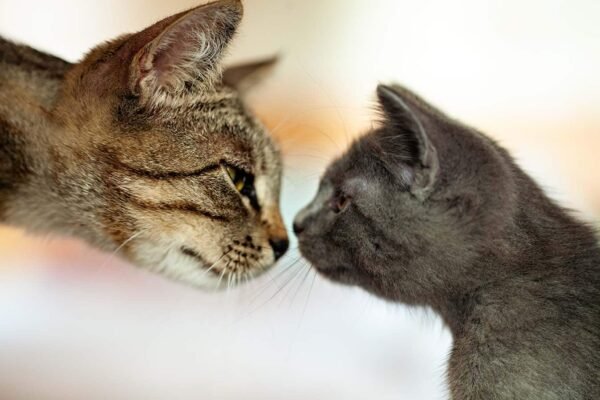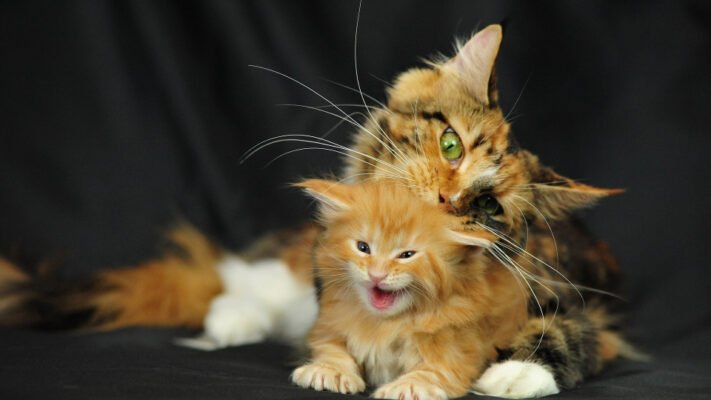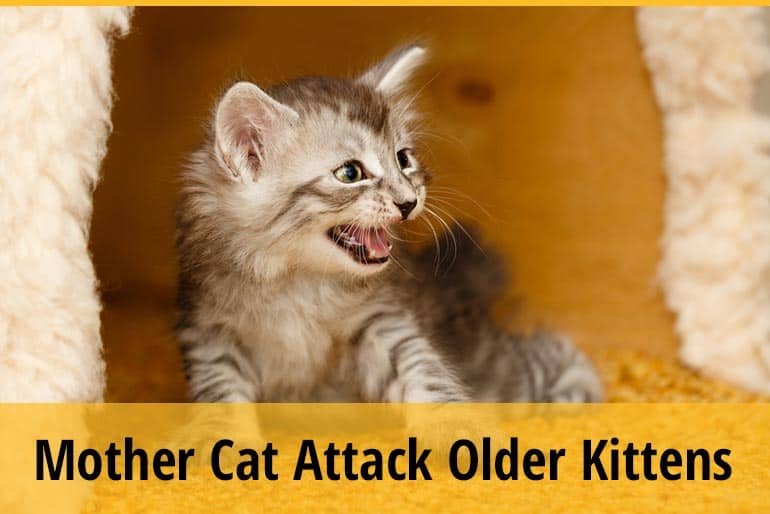About kittens
why do mother cats attack their older kittens
Why do mother cats attack their older kittens?
Reasons for Aggression: Understanding Mother Cat Behavior Towards Older Kittens
why do mother cats attack their older kittens? Mother cats are known for their nurturing and protective nature towards their kittens. They spend countless hours grooming, feeding, and teaching their young ones how to survive in the world. However, there are instances where mother cats may display aggressive behavior towards their older kittens. This may come as a surprise to many, as we often associate mother cats with love and care. So, why do mother cats attack their older kittens? In this article, we will explore the reasons behind this behavior and gain a better understanding of mother cat behavior towards their older kittens.
One of the main reasons for a mother cat’s aggression towards her older kittens is the natural instinct to protect her territory and resources. As kittens grow older, they become more independent and start exploring their surroundings. This can lead to them encroaching on their mother’s territory and resources, such as food and shelter. In the wild, this behavior can be seen as a threat to the mother’s survival and the survival of her younger kittens. As a result, the mother cat may display aggressive behavior towards her older kittens to protect her resources and maintain her dominance.
Another reason for a mother cat’s aggression towards her older kittens is the need to establish a hierarchy within the litter. As kittens grow, they start to develop their own personalities and may challenge their mother’s authority. This can lead to conflicts and fights between the mother and her older kittens. In such situations, the mother cat may use aggression as a way to assert her dominance and maintain order within the litter. This behavior is also seen in the wild, where the mother cat needs to establish a hierarchy to ensure the survival of her litter.
Furthermore, mother cats may also display aggressive behavior towards their older kittens if they feel threatened or stressed. This can happen if the mother cat is in a new environment or if there are changes in her routine. In such situations, the mother cat may become more protective and may lash out at her older kittens if she perceives them as a threat. This behavior is also seen in domesticated cats, where changes in the household, such as the introduction of a new pet or a new family member, can cause stress and trigger aggressive behavior towards older kittens.
It is also essential to consider the mother cat’s past experiences and upbringing when trying to understand her behavior towards her older kittens. If the mother cat has had a traumatic experience in the past, such as being abandoned or abused, she may display aggressive behavior towards her older kittens as a way to protect herself and her litter. Similarly, if the mother cat was not properly socialized as a kitten, she may not know how to interact with her older kittens and may resort to aggression as a means of communication.
Mother Cat aggressing older kittens
In some cases, a mother cat’s aggression towards her older kittens may also be due to underlying health issues. If the mother cat is in pain or discomfort, she may become more irritable and may lash out at her older kittens. It is essential to monitor the mother cat’s behavior and consult a veterinarian if there are any concerns about her health.
In conclusion, there are various reasons why mother cats may display aggressive behavior towards their older kittens. It is essential to understand that this behavior is a natural instinct and is often seen in the wild as well. As responsible pet owners, it is our responsibility to provide a safe and stress-free environment for our feline companions. By understanding the reasons behind a mother cat’s aggression towards her older kittens, we can take necessary measures to ensure the well-being of both the mother and her litter.

Nature vs. Nurture: Exploring the Instinctual Drive for Mother Cats to Attack Their Older Kittens
Mother cats are known for their fierce protection and nurturing instincts towards their young kittens. However, it may come as a surprise to some that in certain cases, mother cats may exhibit aggressive behavior towards their older kittens. This phenomenon raises the question: why do mother cats attack their older kittens? Is it a result of nature or nurture?
To understand this behavior, we must first delve into the nature of cats. Cats are solitary animals by nature, and they have a strong instinct to protect their territory and resources. This instinct is especially heightened when they have young kittens to care for. In the wild, mother cats would fiercely defend their territory and resources from other cats, including their own offspring. This behavior is rooted in the survival of the fittest mentality, where only the strongest and most capable offspring will survive and pass on their genes.
However, in domesticated cats, this instinct may not always align with the nurturing and protective behavior that we expect from mother cats. This is where the role of nurture comes into play. Domesticated cats have been bred and raised in a controlled environment, where they do not have to compete for resources or defend their territory. As a result, their instinctual drive to protect their territory and resources may not be as strong as their wild counterparts.
Furthermore, the relationship between a mother cat and her kittens is not solely based on instinct. It is also influenced by the environment and the mother’s own experiences. A mother cat who has had a traumatic experience with her previous litter may be more aggressive towards her current litter. This is because she may associate her kittens with the negative experience and feel the need to protect herself from potential harm.
Another factor that may contribute to a mother cat’s aggression towards her older kittens is the presence of a new litter. When a mother cat gives birth to a new litter, her focus and attention shift towards the new kittens. This may cause her to become more protective and territorial, leading to aggressive behavior towards her older kittens. In some cases, the mother cat may even see her older kittens as a threat to the survival of her new litter and act accordingly.
It is also important to note that not all mother cats exhibit aggressive behavior towards their older kittens. Some mother cats may continue to care for and protect their older kittens even after giving birth to a new litter. This can be attributed to the nurturing and protective behavior that has been instilled in them through their environment and experiences.
In conclusion, the behavior of mother cats towards their older kittens is a result of both nature and nurture. The instinctual drive to protect their territory and resources, as well as the influence of their environment and experiences, play a significant role in their behavior. It is important for cat owners to understand and respect the natural instincts of their pets, while also providing a safe and nurturing environment for both the mother cat and her kittens. By doing so, we can ensure the well-being and harmony of our feline companions.

Managing Mother Cat Aggression: Tips for Keeping Older Kittens Safe and Reducing Conflict
Mother cats are known for their nurturing and protective nature towards their kittens. They will go to great lengths to ensure the safety and well-being of their young ones. However, there are instances where mother cats may display aggressive behavior towards their older kittens. This can be a cause for concern for cat owners, as they may not understand why their once loving and caring mother cat is now attacking her own offspring. In this article, we will explore the reasons behind this behavior and provide tips for managing mother cat aggression to keep older kittens safe and reduce conflict.
One of the main reasons why mother cats may attack their older kittens is due to the natural instinct of protecting their territory. As kittens grow older, they become more independent and start to explore their surroundings. This can be seen as a threat by the mother cat, who sees her territory being invaded by her own offspring. In order to establish dominance and protect her territory, the mother cat may resort to aggressive behavior towards her older kittens.
Another reason for mother cat aggression towards older kittens is due to the hormonal changes that occur after giving birth. During pregnancy and lactation, mother cats experience a surge in hormones that help them care for their young ones. However, once the kittens are weaned and no longer dependent on their mother, these hormones start to decrease. This sudden change in hormone levels can cause the mother cat to become irritable and aggressive towards her older kittens.
In some cases, mother cat aggression towards older kittens can also be a result of stress or anxiety. Just like humans, cats can also experience stress and anxiety, which can manifest in different ways. For mother cats, the added responsibility of caring for a litter of kittens can be overwhelming and cause them to become stressed. This stress can then lead to aggressive behavior towards their older kittens.
So, what can cat owners do to manage mother cat aggression and keep their older kittens safe? The first step is to understand that this behavior is natural and not a reflection of the mother cat’s love for her kittens. It is important to give the mother cat space and not interfere with her interactions with her kittens. This will allow her to establish her dominance and protect her territory without feeling threatened.
Another tip is to provide the mother cat with a safe and comfortable space where she can retreat to when she needs a break from her kittens. This can be a separate room or a cozy corner in the house where she can relax and destress. This will also give the older kittens a chance to explore and play without being constantly monitored by their mother.
It is also important to ensure that the mother cat is getting enough rest and nutrition. As mentioned earlier, caring for a litter of kittens can be physically and emotionally draining for mother cats. Providing them with a balanced diet and a quiet place to rest will help keep their stress levels in check and reduce the chances of aggressive behavior towards their older kittens.
If the mother cat’s aggression towards her older kittens is becoming a safety concern, it is best to seek advice from a veterinarian or a professional animal behaviorist. They can provide guidance on how to manage the situation and may even suggest medication to help calm the mother cat’s aggressive behavior.
In conclusion, mother cat aggression towards older kittens is a natural behavior that can be caused by various factors such as territorial instincts, hormonal changes, and stress. It is important for cat owners to understand and respect this behavior, while also taking necessary steps to keep their older kittens safe. By providing the mother cat with a safe and comfortable environment, ensuring she gets enough rest and nutrition, and seeking professional help if needed, cat owners can effectively manage mother cat aggression and maintain a peaceful household for both the mother cat and her older kittens.

